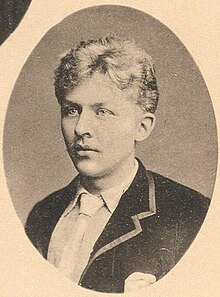Jan Brandts Buys
Jan Brandts Buys (born September 12, 1868 in Zutphen , Netherlands; † December 7, 1933 in Salzburg ) was a Dutch composer.
Life
Jan Willem Frans Brandts Buys (that's his full name, in his homeland the family name is written without a hyphen) came from a very musical family. Many of his ancestors were organists and composers (especially Protestant church music). His father Marius Adrianus held various musical offices in Zutphen. So it was inevitable that the very talented Jan - he was only 13 years old! - found his first job as an organist at the "Broederenkerk" in Zutphen, but preferred to improvise on the larger Baeder organ in the Walpurgis Church. Soon he began to compose piano pieces, songs and chamber music.
Musical guests regularly went in and out of his house, Zaadmarkt 98a. He also maintained a lively exchange of letters, among others with Henryk Wieniawski , Anton Rubinstein and Edvard Grieg . So he got to know the works of the great masters of his time.
In 1889 he began to study music at the Raff Conservatory in Frankfurt am Main. Three years later he continued his studies in Vienna. There he met Johannes Brahms . Brahms recognized his talent for dramatic works and recommended him to compose operas. Brandts Buys took the advice and should not regret it: his oeuvre includes a large proportion of mostly cheerful operas. His best-known was Die Schneider von Schönau , which premiered on April 1, 1916 at the Dresden Court Opera and from here began its triumphal march around the world.
In 1928 Brandts Buys took up residence in Salzburg, where many of his concert works were premiered. Here he also composed the Salzburg Serenade. He died on December 8, 1933 in his adopted home. The city erected a grave of honor for him from "Group 115" in the Salzburg municipal cemetery .
Works (selection)
Operas
- The Violet Festival (1909, Berlin)
- The Glockenspiel (1913, Dresden)
- The Tailors of Schönau (1916, Dresden)
- The Conqueror (1918, Dresden)
- Micarême (1919, Vienna)
- The Man in the Moon (1922, Dresden)
- Dreamland (1927, Dresden)
Instrumental works
- Piano concerto op.15
- Romantic Serenade for String Quartet (op.25)
- Works for piano, organ, orchestra, songs, choirs and cantatas
Web links
- Works by and about Jan Brandts Buys in the catalog of the German National Library
- Sheet music and audio files by Jan Brandts Buys in the International Music Score Library Project
| personal data | |
|---|---|
| SURNAME | Brandts Buys, Jan |
| ALTERNATIVE NAMES | Brandts Buys, Jan Willem Frans |
| BRIEF DESCRIPTION | Dutch composer |
| DATE OF BIRTH | September 12, 1868 |
| PLACE OF BIRTH | Zutphen |
| DATE OF DEATH | December 7, 1933 |
| Place of death | Salzburg |
